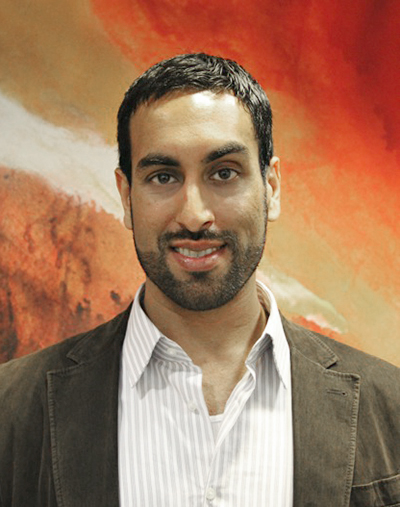
Dr. Gagan Wig’s research uses imaging tools to study human brain networks and how these networks change over the adult lifespan.
Dr. Gagan Wig, who recently joined UT Dallas’ School of Behavioral and Brain Sciences, is looking forward to collaborating with colleagues who share his interest in aging and memory loss at the Center for Vital Longevity.
Wig, an assistant professor, will teach courses on the brain and cognition, as well as connectivity and neuroimaging.
After completing a bachelor’s degree from the University of British Columbia, a doctorate at Dartmouth College and a postdoctoral fellowship at Harvard University, Wig joined the Human Connectome Project at Washington University School of Medicine. He chose to come to CVL because he was “extremely encouraged and inspired” by the level of support UT Dallas has put toward building a world-class brain sciences program.
“The establishment of CVL is exemplary of this strong commitment and is unique in its clear and focused mission,” Wig said.
Besides gaining an opportunity to work alongside a new group of experts in aging and cognition neuroscience, Wig said he is excited about the chance to develop his own research program directed toward studying how the brain changes with age.
Dr. Gagan Wig
TITLE: Assistant professor
RESEARCH INTERESTS: Cognitive neuroscience of memory, brain networks and aging
PREVIOUSLY: Post-doctoral fellow at the Washington University School of Medicine in the Human Connectome Project
Wig’s research program uses a combination of structural and functional imaging tools to understand the organization of large-scale human brain networks and how these networks change over the adult lifespan. He uses this information to guide studies related to memory and attention, with a particular focus on understanding the sources of individual differences in memory and attention, and how they may be affected by aging and disease.
His studies have largely focused on understanding and evaluating the brain at specific points in time, comparing young adults to older adults. He plans to study how the brain changes in an effort to identify the patterns of brain function and connectivity that may ultimately predict cognitive decline far in advance of noticeable behavioral changes.
Dr. Denise Park, co-director and founder of CVL, said Dr. Wig will be a valuable addition to the center’s team of scientists.
“Dr. Wig has an entirely original approach to mapping the landscape of the human brain,” Park said. “He is an emerging leader in the field, and I am thrilled to have him join the Center for Vital Longevity.”
Wig said he has always viewed the brain as complex and interesting.
“The brain is a network, and cognition is a product of how this network communicates,” he said. “I am interested in this basic idea and its ultimate implications.”
“One of the best things about academia is the diversity of people and ideas. It’s always great to hear about others’ research interests, and I love looking for ways that our ideas may intersect. ”
Dr. Gagan Wig,
assistant professor, School of Behavioral and Brain Sciences
The brain functions in the same way that many other networks function, Wig said, but even well-functioning networks can be vulnerable to seemingly minor damage. An unfortunate negative consequence of aging can be the eventual loss of many of the core attributes and abilities that make people who they are. Wig thinks age-related cognitive decline may be related to the susceptibility of brain networks to ongoing deterioration. He believes it’s important to understand how and why age-related cognitive decline occurs, and to try to prevent or forestall it when possible.
Wig already has an ongoing collaboration with Park and the Dallas Lifespan Brain Study. He also plans to work closely with Dr. Michael Rugg, CVL’s other co-director, because they share overlapping interests in memory systems.
Wig said he is enjoying getting settled into his new community.
“One of the best things about academia is the diversity of people and ideas,” he said. “It’s always great to hear about others’ research interests, and I love looking for ways that our ideas may intersect. I’m sure the UTD community will offer many such opportunities, and I look forward to the years to come.”